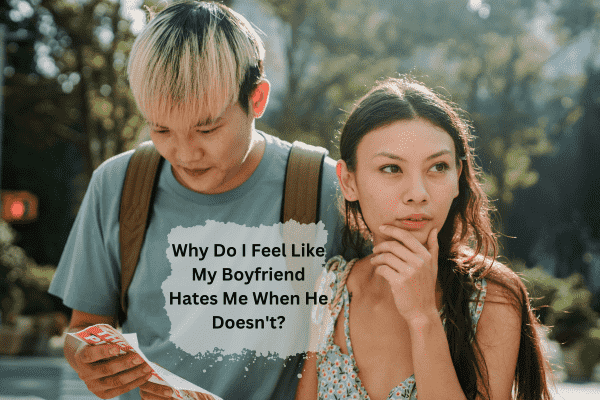Relationships are complex and multifaceted, and it is not uncommon to experience moments of doubt and insecurity. One particularly distressing feeling is the belief that your boyfriend hates you, even when there is no substantial evidence to support this notion. This sensation can stem from a variety of psychological, emotional, and interpersonal factors. In this comprehensive article, we will explore these factors in depth and provide strategies to address and overcome these feelings.
Why Do I Feel Like My Boyfriend Hates Me When He Doesn’t? Psychological Factors
Insecurity and Low Self-Esteem
Insecurity and low self-esteem are common reasons why you might feel like your boyfriend hates you. If you have a negative self-image, you may project these feelings onto your relationship. This projection can make you misinterpret your boyfriend’s actions and words as signs of dislike or disapproval.
Insecurity often originates from past experiences, such as previous relationships where you were hurt or betrayed, or from childhood experiences that impacted your self-worth. When you carry these insecurities into your current relationship, you may overanalyze your boyfriend’s behavior, looking for signs that confirm your fears.
Example: Imagine your boyfriend is busy with work and doesn’t respond to your texts as quickly as he usually does. If you are insecure, you might interpret his delayed responses as a sign that he is losing interest in you, even though the real reason is simply his workload.
Attachment Styles
Attachment theory, developed by psychologists John Bowlby and Mary Ainsworth, suggests that the way we form attachments in early childhood with our primary caregivers affects our relationships later in life. There are four main attachment styles: secure, anxious-preoccupied, dismissive-avoidant, and fearful-avoidant.
Anxious-Preoccupied Attachment: If you have an anxious-preoccupied attachment style, you are more likely to feel like your boyfriend hates you. This style is characterized by a high need for approval and reassurance, combined with a fear of abandonment. Any perceived lack of attention or affection from your boyfriend can trigger anxiety and lead you to believe he dislikes or hates you.
Example: If your boyfriend is not as affectionate one evening because he is tired, an anxious-preoccupied person might think, “He must be upset with me” or “He’s not interested in me anymore,” even though the actual reason is unrelated to you.
Cognitive Distortions
Cognitive distortions are irrational thought patterns that can negatively influence your perception of reality. Common cognitive distortions include:
- Catastrophizing: Expecting the worst-case scenario. For instance, if your boyfriend is late to respond to a text, you might immediately assume he’s angry or losing interest in you.
- Mind Reading: Assuming you know what others are thinking without any concrete evidence. You might think, “He didn’t say he loves me today, so he must hate me.”
- Personalization: Believing that everything others do or say is a direct reaction to you. If your boyfriend seems distracted, you might assume it’s because of something you did wrong.
These distorted thought patterns can cause you to misinterpret your boyfriend’s behavior and create a false narrative that he hates you.
Example: If your boyfriend is preoccupied with a personal problem and isn’t as communicative as usual, you might catastrophize by thinking, “He doesn’t care about me anymore,” rather than considering that he might be dealing with something unrelated to you.
Interpersonal Dynamics
Communication Issues
Effective communication is the cornerstone of a healthy relationship. Miscommunication or a lack of communication can lead to misunderstandings and false assumptions. If you feel like your boyfriend hates you, it could be because you are not expressing your feelings and concerns openly.
Example: If you feel insecure about the relationship but do not communicate this to your boyfriend, he may not realize there is an issue. His unawareness might lead to behavior that unintentionally reinforces your fears, such as not providing the reassurance you need.
Differences in Expression of Love
People have different love languages, as described by Dr. Gary Chapman. The five love languages are words of affirmation, acts of service, receiving gifts, quality time, and physical touch. If you and your boyfriend have different primary love languages, you might feel unloved or neglected even if he cares deeply for you.
Example: If your love language is words of affirmation and your boyfriend’s is acts of service, he might show his love by doing things for you rather than verbally expressing his feelings. If you are not aware of this difference, you might misinterpret his actions as a lack of love or affection.
Past Trauma and Relationship Baggage
Past traumas, such as previous relationships that ended badly, can significantly impact how you perceive your current relationship. If you have been hurt before, you might be hypervigilant and sensitive to any signs that your boyfriend might hurt you too. This can lead to a constant fear that he might hate or leave you, even if there is no real basis for these fears.
Example: If your previous partner cheated on you, you might find it difficult to trust your current boyfriend completely, interpreting any small, benign actions as potential red flags.
Emotional and Mental Health
Anxiety and Depression
Mental health conditions like anxiety and depression can distort your perception of reality. Anxiety, in particular, can make you excessively worry about your relationship and fear the worst. Depression can lead to feelings of worthlessness and hopelessness, making it difficult to believe that someone could genuinely love you.
Example: If you suffer from anxiety, you might obsess over small details, such as a change in your boyfriend’s tone of voice, interpreting it as a sign of anger or disinterest, when in reality, it might be due to stress or fatigue.
Projection of Inner Feelings
Sometimes, the feeling that your boyfriend hates you can be a projection of your own inner feelings. If you are unhappy or dissatisfied with yourself, you might project these negative feelings onto your boyfriend, convincing yourself that he feels the same way about you.
Example: If you are feeling particularly low about yourself, you might start to believe that your boyfriend also sees you in a negative light, despite his actions and words indicating otherwise.
Strategies to Address These Feelings
Open and Honest Communication
The foundation of any healthy relationship is open and honest communication. If you feel like your boyfriend hates you, talk to him about it. Express your feelings without blaming or accusing him. Use “I” statements to focus on your emotions and experiences, such as “I feel insecure when…”
Encourage your boyfriend to share his feelings as well. Understanding each other’s perspectives can help clear up misunderstandings and strengthen your bond.
Example: Initiate a calm and honest conversation where you say, “I’ve been feeling a bit insecure lately because I’ve noticed you seem distracted. Can we talk about it?”
Understanding Love Languages
Learn about each other’s love languages and make an effort to express love in ways that resonate with both of you. This understanding can help bridge any gaps in how you each show and receive love, reducing feelings of neglect or misunderstanding.
Example: If you know that your boyfriend’s love language is acts of service, you might start appreciating his efforts more, while he can try to incorporate more words of affirmation into his expressions of love for you.
Challenge Cognitive Distortions
Work on identifying and challenging your cognitive distortions. When you catch yourself catastrophizing or mind reading, take a step back and question the validity of these thoughts. Ask yourself if there is concrete evidence to support your beliefs or if you might be jumping to conclusions.
Example: If you start thinking, “He didn’t call me back, he must be mad at me,” challenge this thought by considering alternative explanations, such as he might be busy or his phone battery died.
Seek Therapy or Counseling
Therapy can be incredibly beneficial for addressing underlying psychological issues that contribute to your feelings of insecurity. A therapist can help you work through past traumas, develop healthier thought patterns, and improve your self-esteem.
Couples counseling can also be helpful if both you and your boyfriend are open to it. A therapist can facilitate better communication and understanding between you, helping to resolve any underlying issues in your relationship.
Example: Consider seeing a therapist to work on your self-esteem issues and explore how past experiences are affecting your current relationship. If both of you are open to it, couples counseling can provide a neutral space to discuss your concerns.
Practice Self-Care and Self-Compassion
Taking care of your mental and emotional well-being is essential. Engage in activities that make you feel good about yourself and build your self-esteem. Practice self-compassion by treating yourself with kindness and understanding, rather than being overly critical.
Example: Set aside time each day for activities that you enjoy and that help you relax, such as reading, exercising, or spending time with friends. Practicing mindfulness and meditation can also help you stay grounded and reduce anxiety.
Build a Support System
Having a strong support system of friends and family can provide additional emotional support and perspective. Sometimes, discussing your feelings with someone you trust can help you gain a clearer understanding of the situation.
Example: Reach out to a close friend or family member and share your feelings with them. Their perspective can provide reassurance and help you see things more objectively.
Conclusion
Feeling like your boyfriend hates you when he doesn’t is a multifaceted issue that can arise from various psychological, interpersonal, and emotional factors. Insecurity, attachment styles, cognitive distortions, communication issues, past traumas, and mental health conditions can all contribute to these feelings.
Addressing these feelings requires a multifaceted approach, including open communication, understanding each other’s love languages, challenging cognitive distortions, seeking therapy, practicing self-care, and building a support system. By taking these steps, you can work towards a healthier, more secure relationship and a more positive self-image.
Remember, relationships are a journey, and it’s normal to experience bumps along the way. The key is to approach these challenges with empathy, understanding, and a willingness to work through them together. With patience and effort, you can build a stronger, more loving relationship and overcome the insecurities that may be holding you back.



